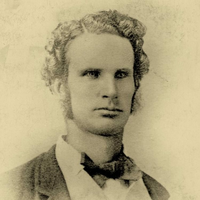Scene 1. a Castle in Normandy
Hugo.
Well, boy, what is it?
Henry.
The feast is spread.
Hugo.
Why tarry the guests for me?
Let Eric sit at the table’s head;
Alone I desire to be.
[Henry goes out.]
What share have I at their festive board?
Their mirth I can only mar;
To me no pleasure their cups afford,
Their songs on my silence jar.
With an aching eye and a throbbing brain,
And yet with a hopeful heart,
I must toil and strain with the planets again
When the rays of the sun depart;
He who must needs with the topers tope,
And the feasters feast in the hall,
How can he hope with a matter to cope
That is immaterial?
Orion.
He who his appetite stints and curbs,
Shut up in the northern wing,
With his rye-bread flavoured with bitter herbs,
And his draught from the tasteless spring,
Good sooth, he is but a sorry clown.
There are some good things upon earth–
Pleasure and power and fair renown,
And wisdom of worldly worth!
There is wisdom in follies that charm the sense,
In follies that light the eyes,
But the folly to wisdom that makes pretence
Is alone by the fool termed wise.
Hugo.
Thy speech, Orion, is somewhat rude;
Perchance, having jeer’d and scoff’d
To thy fill, thou wilt curb thy jeering mood;
I wot thou hast served me oft.
This plan of the skies seems fairly traced;
What errors canst thou detect?
Orion.
Nay, the constellations are misplaced,
And the satellites incorrect;
Leave the plan to me; you have time to seek
An hour of needful rest,
The night is young and the planets are weak;
See, the sun still reddens the west.
Hugo.
I fear I shall sleep too long.
Orion.
If you do
It matters not much; the sky
Is cloudy, the stars will be faint and few;
Now, list to my lullaby.
[Hugo reclines on a couch.]
(Sings.)
Still the darkling skies are red,
Though the day-god’s course is run;
Heavenly night-lamps overhead
Flash and twinkle one by one.
Idle dreamer-earth-born elf!
Vainly grasping heavenly things,
Wherefore weariest thou thyself
With thy vain imaginings?
From the tree of knowledge first,
Since his parents pluck’d the fruit,
Man, with partial knowledge curs’d,
Of the tree still seeks the root;
Musty volumes crowd thy shelf
Which of these true knowledge brings?
Wherefore weariest thou thyself
With thy vain imaginings?
Will the stars from heaven descend?
Can the earth-worm soar and rise?
Can the mortal comprehend
Heaven’s own hallow’d mysteries?
Greed and glory, power and pelf
These are won by clowns and kings;
Wherefore weariest thou thyself
With thy vain imaginings?
Sow and reap, and toil and spin;
Eat and drink, and dream and die;
Man may strive, yet never win,
And I laugh the while and cry
Idle dreamer, earth-born elf!
Vainly grasping heavenly things,
Wherefore weariest thou thyself
With thy vain imaginings?
He sleeps, and his sleep appears serene,
Whatever dreams it has brought him
[Looks at the plans.]
If he knows what those hieroglyphics mean,
He’s wiser than one who taught him.
Why does he number the Pole-star thus?
Or the Pleiades why combine?
And what is he doing with Sirius,
In the devil’s name or in mine?
Man thinks, discarding the beaten track,
That the sins of his youth are slain,
When he seeks fresh sins, but he soon comes back
To his old pet sins again.

